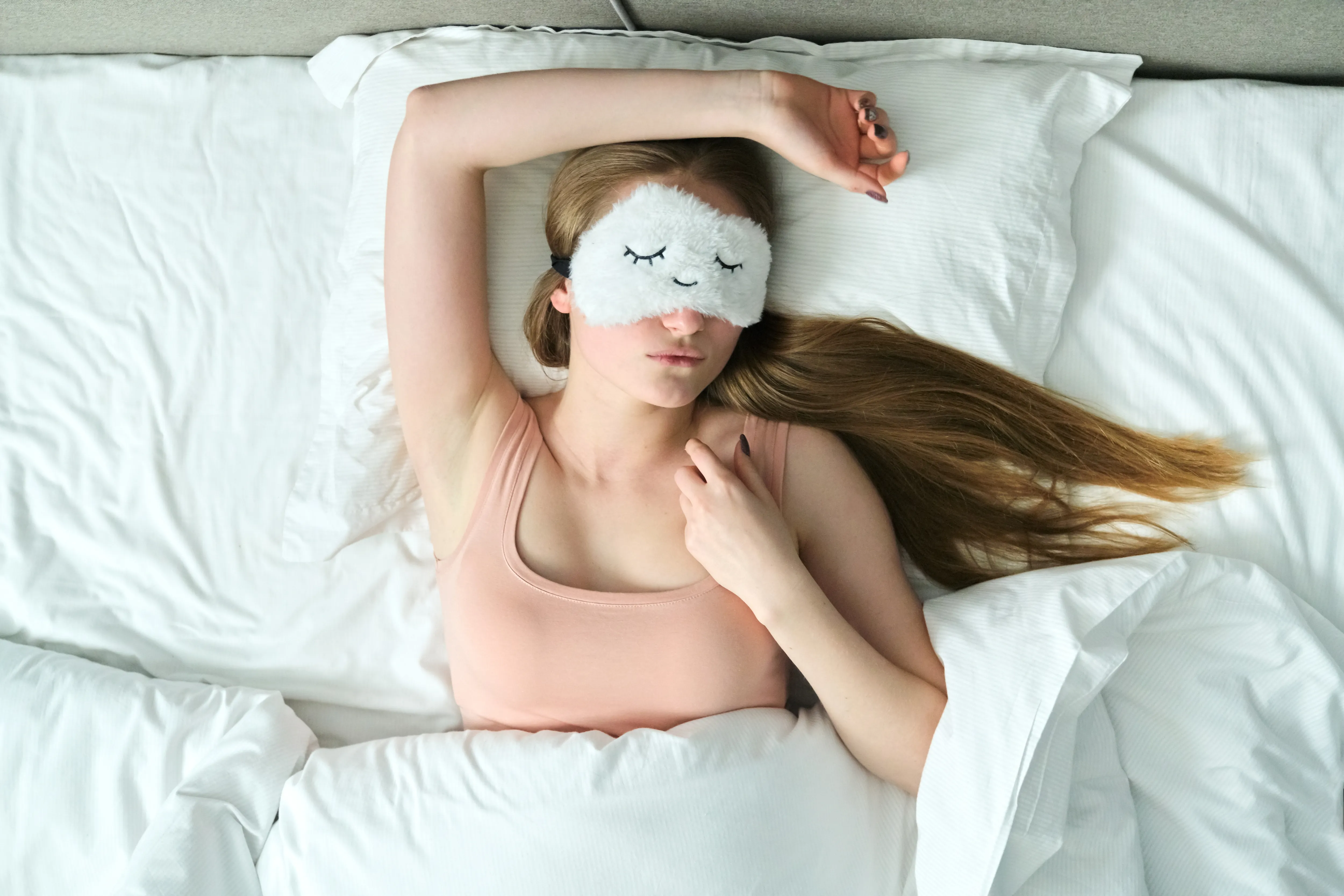In today's fast-paced world, quality sleep is often overlooked — yet it's one of the most vital components of our overall health.
Among the various stages of sleep, deep sleep plays a uniquely restorative role. It's the phase where your body heals, your brain consolidates memories, and your immune system strengthens. Unfortunately, many people struggle to get enough of it, often without even realizing it.
This article explores the science behind deep sleep, why it matters, what can disrupt it, and, most importantly, how you can improve it through practical lifestyle changes.
What is Deep Sleep?
Deep sleep, also known as slow-wave sleep (SWS), is the most restorative stage of the sleep cycle. It’s part of non-REM sleep and is characterized by slow brain waves, minimal muscle activity, and a general state of physiological tranquility. This stage is crucial for both physical restoration and cognitive function.
Sleep Architecture Overview
Sleep occurs in cycles that alternate between non-REM and REM (Rapid Eye Movement) stages. Non-REM sleep is divided into three stages, with deep sleep occurring in the third. Deep sleep typically takes place in the first half of the night and becomes shorter as the night progresses.
The Science Behind Deep Sleep and Its Benefits for Well-Being

The science behind deep sleep reveals its significant impact on both your physical and mental health. During deep sleep, your body undergoes various physiological changes, including a reduced heart rate, slower breathing, and a decrease in body temperature. These changes promote the body's recovery and rejuvenation processes, which are vital for maintaining physical health.
Physiological Changes During Deep Sleep
Deep sleep brings about a set of physical changes that signal the body’s entry into a healing and restorative state:
- Slowed Heart Rate and Breathing: The autonomic nervous system shifts into a parasympathetic state, conserving energy and reducing cardiovascular strain.
- Reduced Body Temperature: The body cools slightly, creating optimal conditions for cell regeneration and hormonal balance.
- Muscle Relaxation: Muscle activity diminishes, allowing the body to rest and repair tissue damaged during the day.
- Increased Cellular Repair and Growth: Growth hormone is secreted, supporting the regeneration of skin, muscles, and bones, as well as other vital cellular processes.
Mental Health Benefits
Deep sleep doesn’t just repair the body — it restores the mind. Its role in emotional and cognitive stability is profound:
- Emotional Regulation: Emotional Regulation helps process emotions and reduce next-day emotional reactivity.
- Decision-Making and Cognitive Clarity: Decision-making consolidates memories, clears mental clutter, and improves memory and problem-solving.
- Stress Relief via Prefrontal Cortex Restoration: Prefrontal Cortex Restoration recharges the brain’s executive center, reducing anxiety and improving rational thinking.
Immune System Support
While you sleep, your immune system works harder to defend the body:
- Cytokine Production: These infection-fighting proteins are released more during deep sleep, helping the body ward off illnesses.
- Strengthened Overall Immunity: A lack of deep sleep can make you more vulnerable to infections, while consistent deep sleep enhances immune defenses.
Factors Affecting Deep Sleep Quality

Several factors can impact the quality of your deep sleep, including lifestyle choices, environment, and stress levels. One of the primary factors is your sleep schedule. Maintaining a consistent sleep routine helps regulate your body's internal clock, promoting better deep sleep. Irregular sleep patterns can disrupt this rhythm, reducing the duration and quality of deep sleep.
Lifestyle and Habits
Irregular sleep schedules and poor sleep hygiene — such as inconsistent bedtimes, exposure to screens late at night, or lack of wind-down routines — can interfere with your ability to enter and maintain deep sleep. Healthy habits are essential for quality rest.
Environmental Influences
Your surroundings play a big role in sleep depth. Light, noise, uncomfortable bedding, or a room that's too warm or cold can all disrupt sleep. A quiet, dark, cool, and comfortable environment supports deeper, more restorative sleep.
Psychological Factors
Mental stress and anxiety elevate cortisol levels, which can delay the onset of sleep and reduce time spent in deep sleep stages. A calm mind and emotional balance are crucial for uninterrupted rest and recovery.
Medical Conditions That Disrupt Deep Sleep
Certain medical conditions can significantly interfere with your ability to achieve or maintain deep sleep, reducing its restorative benefits. Recognizing and addressing these issues is crucial for improving overall sleep quality.
Sleep Apnea
Sleep apnea is a disorder where breathing repeatedly stops during sleep, causing frequent awakenings. These interruptions prevent the body from reaching deep sleep, leading to daytime fatigue, poor concentration, and long-term health risks if left untreated.
Restless Legs Syndrome (RLS)
RLS causes uncomfortable sensations in the legs and an urge to move them, especially at night. This restlessness can make it hard to fall asleep and disrupt the progression into deep sleep, often leaving individuals feeling unrested.
Chronic Pain or Anxiety
Ongoing pain or anxiety can keep the brain in a heightened state of alertness, making it difficult to relax into deep sleep. These conditions often cause fragmented sleep and reduce its restorative quality, impacting both physical and mental health.
Tips on How to Get More Deep Sleep

Improving your deep sleep can be achieved through various strategies. Here are some practical tips to help you enhance your deep sleep quality:
Prioritize Total Sleep Duration
The more total sleep you get, the more time your body has to cycle through all stages, including deep sleep. Aim for 7–9 hours nightly. Deep sleep occurs primarily in the early part of the night, so cutting your sleep short reduces access to the most restorative phase. Prioritizing sleep also helps regulate hormones, immunity, and mental clarity.
Maintain a Regular Sleep Schedule
Go to bed and wake up at the same time every day — even on weekends — to regulate your body clock and improve sleep consistency. This reinforces your circadian rhythm, making it easier to fall asleep and wake up naturally. Irregular sleep patterns can confuse your body and reduce time spent in deep sleep.
Optimize Your Sleep Environment
Use blackout curtains, earplugs, and a white noise machine, and keep the room cool and clutter-free. Choose supportive bedding tailored to your comfort. A dark, quiet space helps your brain release melatonin, while a cool temperature promotes the drop in core body heat necessary for deep sleep.
Create a Relaxing Bedtime Routine
Wind down with calming activities like reading, stretching, journaling, or warm baths to cue your body for rest. This signals your brain to transition from wakefulness to sleep. Avoid stimulating tasks like checking emails or watching intense shows, which can keep your mind active.
Limit Exposure to Screens
Avoid phones, tablets, and computers 1–2 hours before bed. Blue light disrupts melatonin, a hormone that regulates sleep cycles. Instead, switch to soft lighting, read a book, or listen to calming music to prepare your body for sleep.
Practice Relaxation Techniques Before Bed
Try deep breathing, progressive muscle relaxation, mindfulness meditation, or yoga to reduce anxiety and quiet the mind. These techniques activate the parasympathetic nervous system, helping your body unwind. Even five minutes of focused relaxation can ease the transition into deeper sleep.
Avoid Stimulants and Alcohol
Caffeine and nicotine delay sleep onset and reduce deep sleep. Alcohol may help you fall asleep initially, but it fragments sleep later. Limit these substances in the evening to allow natural sleep processes to occur without interruption.
Exercise Regularly
Moderate daily activity improves sleep depth — just avoid vigorous workouts close to bedtime. Physical activity helps regulate circadian rhythms and reduces stress, which are both essential for deep sleep. Aim to exercise earlier in the day or at least 3 hours before bedtime.
Watch Your Diet
Avoid heavy meals late at night. Instead, try light, sleep-supportive snacks like a banana, almonds, or herbal teas (e.g., chamomile). Foods rich in tryptophan and magnesium can support melatonin production and muscle relaxation.
Minimize Distractions
Creating a distraction-free space is essential to uninterrupted sleep:
- Electronics Out of the Bedroom: Keep TVs, phones, and computers out of your sleep area to reduce exposure to blue light and mental stimulation.
- Aromatherapy: Calming scents such as lavender or chamomile can promote relaxation and signal your body that it’s time to wind down.
Sleep-Supportive Nutrients
Certain nutrients naturally support the sleep cycle and can be included in your evening routine:
- Magnesium: It helps relax muscles and nerves and supports melatonin production. Found in nuts, seeds, leafy greens, and whole grains.
- Tryptophan: An amino acid that aids serotonin and melatonin synthesis. Present in turkey, dairy products, eggs, and legumes.
- Complex Carbohydrates: Whole grains, sweet potatoes, and brown rice can help increase tryptophan availability in the brain, promoting better sleep.
FAQs
How much deep sleep do I need each night?
On average, adults need about 1.5–2 hours of deep sleep per night, which accounts for 15–20% of total sleep time.
What are the signs of insufficient deep sleep?
Common signs include feeling worn out upon waking, experiencing difficulty concentrating, and having a weakened immune system.
Can naps help improve deep sleep quality?
While naps can provide a short-term energy boost, they should be limited to 20–30 minutes to avoid interfering with deep sleep at night.
How does aging affect deep sleep?
As you age, the amount of deep sleep you experience typically decreases, making it essential to prioritize sleep hygiene and healthy habits.
Is it possible to make up for lost deep sleep?
While you can't fully compensate for lost deep sleep, improving sleep habits can help you achieve better sleep quality in the future.
Can supplements improve deep sleep?
Supplements like melatonin or magnesium may help some individuals, but it's essential to consult a healthcare professional before use.
Conclusion
Deep sleep is more than just a stage of slumber — it’s a foundation for physical vitality, emotional stability, and mental clarity. By understanding what supports and hinders this essential part of your sleep cycle, you can make informed changes that enhance your well-being.
Dom Abraham
As the lead content writer at Sleepiverse. Dom pours his heart into writing mattress reviews, bedding product reviews, and medically-reviewed health articles. Dom is from Portugal and likes to spend his free time writing on the beach as it gives him a sense of comfort. Aside from writing mattress reviews in front of the soothing beach view, Dom likes to experiment with new amazing food ideas.


